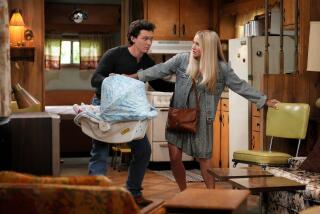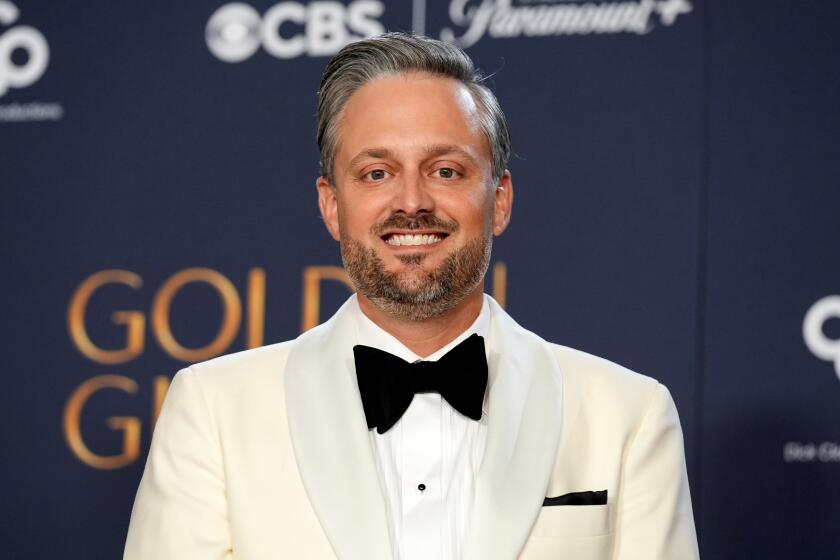Dons Replaced by Dimwits in Otherwise Likable ‘Life’
- Share via
Italian Americans who complained about being stereotyped by “The Sopranos” have yet to be heard from about the likable new CBS series “That’s Life.” Yet it, too, sings a familiar “Mambo Italiano.”
Well, it’s early. “That’s Life” is a baby, just two episodes old and struggling to find an audience, whereas two entire blocs of “The Sopranos” have run superbly on HBO, earning Emmy nominations, huge praise from critics and much buzz about its strong acting and densely layered Mafia story line.
Plus drawing outrage from seven Italian American organizations that accused “The Sopranos” of tainting the images and reputations of an estimated 20 million Americans of Italian heritage.
As movie and TV gangsters named Sal, Carlo and Vito have done for years.And contends Maria Laurino in her book “Were You Always Italian?,” as Tony Manero and his Bensonhurst crowd did more benignly in “Saturday Night Fever.”
Except for their ethnicity and New Jersey locale, “The Sopranos” and “That’s Life” are entirely dissimilar.
Murder pervades “The Sopranos,” whose central figure is a conflicted, stressed-out Mafia boss seeking to balance the criminal agenda of his crime family with that of his family at home.
“That’s Life” is about Italian Americans who aren’t Mafiosi. They’re decent, law-abiding folks who whack, at times, only the English language.
In fact, “That’s Life” is a happy, charming series in most ways and easily one of the very best new dramas of the young season, thanks largely to Heather Paige Kent’s beguiling earthiness and effervescence as Lydia DeLucca. Lydia is a feisty, resourceful, gabby 32-year-old bartender who each week, in role reversal, pours out her woes to a silent, chain-smoking drinker on a stool. Lydia is refreshingly real and vibrant.
Very appealing also are her optimism, tenacious spirit and chumminess with loyal pals Candy (Kristin Bauer) and Jackie (Debi Mazar). But. . .
Uh oh.
The premiere found Lydia creating a major crisis in her Italian American milieu when aborting her wedding plans with a popular lug named Lou (Sonny Marinelli) and instead enrolling as a college freshman. “I wanna meet people from other ZIP Codes and talk to them about ‘War and Peace,’ existentialism and the Great Wall of China,” she explains in Saturday’s third episode.
It’s the wall of resistance potentially separating her from her dreams she must worry about. “Marriage and family,” she’s lectured. “That’s what matters.”
Echoing throughout “That’s Life” is the stage-based British film “Educating Rita,” whose mouthy 30ish hairdresser also picked college over a boyfriend, her new mentor turning out to be a hack scholar who drank too much. A drunken professor (Peter Firth) is part of Lydia’s life, as well, both as a nasty teacher you’d like to snuff and as a regular at her tavern who ends his nights potted, on rubbery legs.
Where the two women’s scenarios intersect most vividly, though, is in conflicts between their blue-collar environments and their goals and new intellectual growth.
In the CBS series, that Vesuvius of class rumbling springs loose an enduring movie/TV stereotype of overcooked Italian American behavior in a family that eats mainly traditional dishes and is old-school, much like the Brooklyn Italians in “Moonstruck.”
In her book about ethnic identity, Laurino ticks off theatrical films in which Brooklyn Italians have been stereotyped “as dons or dimwits.” Owning TV’s don franchise is “The Sopranos,” leaving dimwits to “That’s Life.”
Although Lydia herself is a heroine, just about everybody is mad at her for dumping Lou, who wanted her to stay home and make babies. College? Her old-fashioned mother (Ellen Burstyn) just doesn’t get it. Her father (Paul Sorvino), a collector on a tollway, has fretted about her taking “foo-foo courses” and advised her to “go to Mass” if she wanted to find herself. And growing more infantile each week, her cop brother (Kevin Dillon) has become a one-man posse defending the honor of his pal, Lou. On Saturday he uses his badge to harass Lydia and a 23-year-old male classmate whose friendship with her has made Lou jealous.
Everyone in this Italian American neighborhood appears to have Lou on the brain. Lydia can’t even enter a cafe that’s a local haunt without getting lectured about him. And her Lou-loving family makes her account for hanging out with her younger fellow student, as if she were a callow teenager instead of a mature woman, one who spends her nights in a smoky bar, for heaven’s sake.
Unlike viewers of the series, Lydia’s friends and family are too dense to see the obvious, that she is infinitely better off in a classroom than in the arms of that meatball Lou, who is so childish that last week he tried to steal back her engagement ring and make off with some of her underwear.
Yeah, but, he’s Italian, y’know?
It’s understandable that Italian American groups would be more tolerant of nonviolent “That’s Life” than “The Sopranos,” which they charged in a joint statement with “defaming and assassinating the cultural character of Italian Americans by using the religion, customs and values in a violent and immoral context. . . . “
“That’s Life” characters are more sympathetic. In the second episode, Lydia’s dad turned softie and just before the closing credits even forked over a few bills to help his struggling daughter with her expenses. That nourished another Italian American stereotype, one of the family that ultimately puts aside differences and warmly closes ranks. That popular lore, at least, gets exploded on “The Sopranos,” notable for Tony Soprano’s hateful relationship with his sister and near-murderous one with his mother and uncle.
Yes, they’re all Italians, and thanks to the relentless images of movies and TV, the rest of America wants them that way.
* “That’s Life” airs Saturdays at 8 p.m. on CBS. The network has rated it TV-PG-L (may be unsuitable for young children with special advisories for coarse language).
Howard Rosenberg’s column appears Mondays, Wednesdays and Fridays. He can be reached by e-mail at howard.rosenberg@latimes.com.
More to Read
The complete guide to home viewing
Get Screen Gab for everything about the TV shows and streaming movies everyone’s talking about.
You may occasionally receive promotional content from the Los Angeles Times.






